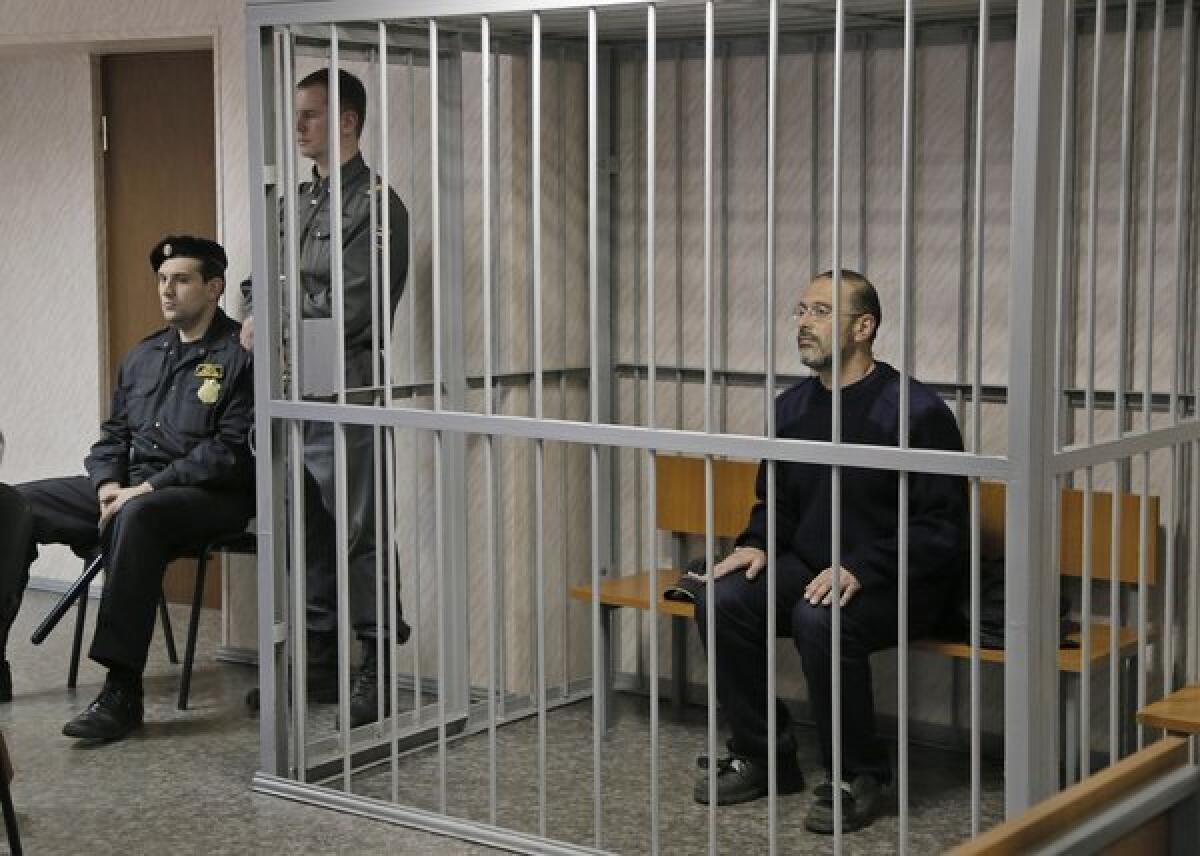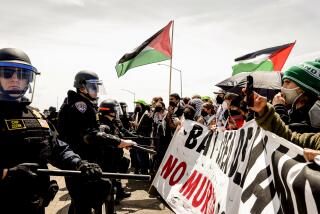Russia charges 14 Greenpeace activists with piracy

MOSCOW -- Five Greenpeace activists were charged Wednesday morning with piracy in connection with a protest at a Russian oil platform, an official of the environmental group said.
Roman Dolgov of Russia, Sini Saarela of Finland, Anna Paula Maciel of Brazil, Kieron Bryan of Britain and Dima Litvinov, who has U.S. and Swedish citizenship, were charged with organized group piracy in the northern Russian city of Murmansk, according to Vladimir Chuprov, head of Greenpeace Arctic.
[Updated, 8:55 a.m. PDT Oct. 2: Later Wednesday, an additional nine protesters were charged with piracy as the preceedings continued into the evening.]
The charge can carry a sentence of up to 15 years in prison and a fine of up to $15,000.
“We hoped to the last that common sense would prevail, and Russian authorities would not resort to such absurd actions but they proved us wrong,” Chuprov told The Times. “Piracy means seizing someone’s property through a threat or an act of violence and a motive of making illegal profits from it, none of which can be applied to our activists who were engaged in a peaceful protest against the harmful exploration of the Arctic.”
The five were part of the group of 30 activists and crew members aboard the Greenpeace ice breaker Arctic Sunrise, which was seized by the Russian coast guard in a commando operation Sept. 19.
The raid came a day after some of the activists tried to climb the side of a Russian oil-drilling platform in the Barents Sea, allegedly to hang a banner protesting drilling in the Arctic.
After the raid, the ship was towed to Murmansk, a major Russian port city in the Kola Bay, where the activists and crew were escorted to a preliminary detention center.
Late last week, a local court ruled that all of the protesters, including a Russian freelance photographer, were to stay in custody until Nov. 24, pending an investigation.
The protesters resisted coast guard officials and endangered the security of workers and property at the oil rig, the Investigative Committee in Moscow said on its website earlier this week.
The platform Prirazlomnaya is a major Arctic oil exploration project of a subsidiary of the state-controlled energy company Gazprom.
Gazprom spokesman Sergei Kupriyanov complained last week that the Greenpeace activists endangered the lives of the company’s divers, who were working underwater near the platform at the time of the protest.
The five activists remained in prison Wednesday after the charges were announced. Chuprov said he had little doubt that the remaining detainees would also be charged.
The charges came despite a public statement last week from Russian leader Vladimir Putin that the activists were “obviously not pirates.”
The decision to press such serious charges “for at worst an administrative felony” indicates that hard-liners are getting an upper hand in the ongoing clash of Kremlin clans, said Valery Borshchev, a prominent rights activist.
“Thus the Kremlin continues to demonstrate its adherence to the tactics of sheer intimidation toward its opponents and anyone who dares to criticize its policies,” Borshchev, an advisor to the Presidential Human Rights Envoy, told The Times. “If such intimidation actions have hitherto been limited to critics at home resulting in investigations of opposition activists, the trials and convictions of the Pussy Riot band and opposition leader Alexei Navalny, now they demonstrate they are not shy to intimidate foreigners either.”
Borshchev, however, said he doubted that a charge of piracy will stand, and that it it will likely be replaced with a lesser charge in the near future.
Greenpeace will appeal the charges in Russian courts and, if necessary, in the European Court of Human Rights, Chuprov said.
ALSO:
Netanyahu warns of Iran ‘charm offensive,’ deceit on nuclear arms
Travelers, traders among potential foreign victims of U.S. shutdown
State Department rejects Venezuelan accusations against diplomats
More to Read
Sign up for Essential California
The most important California stories and recommendations in your inbox every morning.
You may occasionally receive promotional content from the Los Angeles Times.










